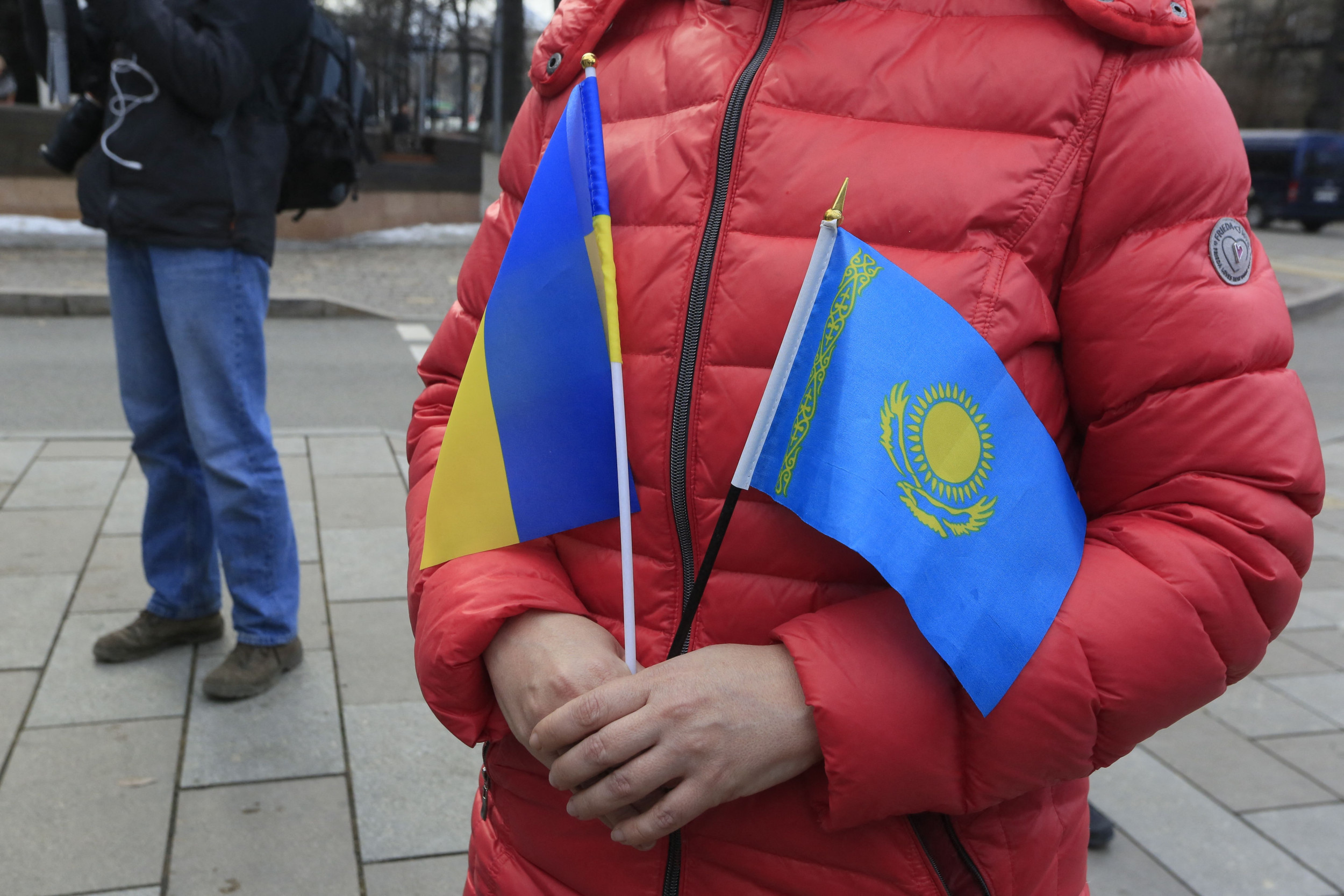Chernobyl Anniversary Serves as Nuclear Warning in Ukraine
The Chernobyl disaster in 1986 still looms large in the collective memory in Ukraine, with the 1,000-square-mile exclusion zone around the town of Pripyat and the ill-fated Soviet-era plant a testament to the danger of mishandled nuclear power.
Wednesday marks the 37th anniversary of the incident, which officially claimed 31 lives but may have proved responsible for thousands more. The explosion and subsequent fire at the plant's Number 4 reactor spread radioactive material over more than 77,000 square miles of Europe, mostly in Ukraine, Belarus and Russia.
Nearly four decades years later, Ukraine is grappling with the threat of a new nuclear catastrophe.
Ukrainian troops are preparing a counterattack against Russian forces occupying some 20 percent of the country, hoping to further roll back Moscow's 14-month-old invasion—an assault that initially saw fighting in the Chernobyl exclusion zone. Reportedly, Russian soldiers fell ill after digging trenches in the contaminated earth there.
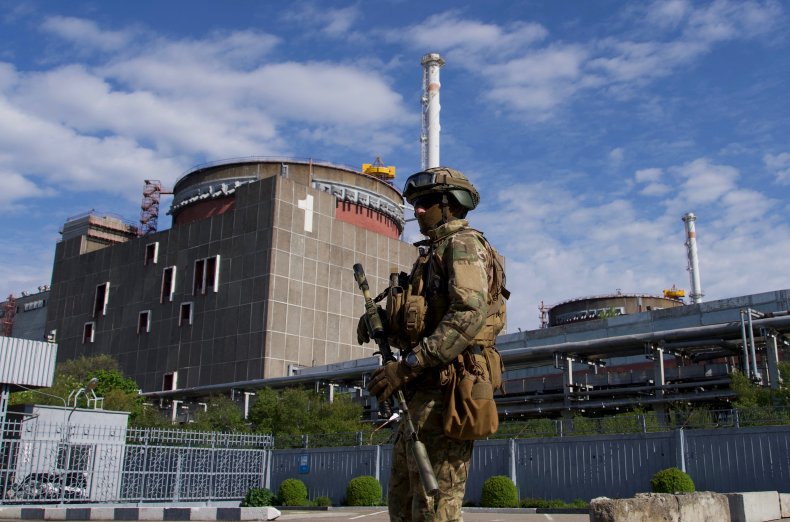
Now, the most pressing danger lies some 330 miles to the southeast, on the banks of the Dnieper River, where Russian soldiers are occupying the Zaporizhzhia nuclear power plant—the largest of its kind in Europe—and awaiting a new Ukrainian offensive.
The plant has been a flash point ever since Russian troops stormed the facility in March 2022, eight days into the full-scale invasion. Over the past 14 months, the facility has been shot at with small arms, shelled with artillery and attacked by drones. Photos and videos have shown Russian military equipment parked inside a turbine hall and heavily armed soldiers inside and close to sensitive nuclear equipment.
International Atomic Energy Agency Director General Rafael Mariano Grossi said this week he is "deeply concerned about the situation at the plant."
"I saw clear indications of military preparations in the area when I visited the Zaporizhzhia Nuclear Power Plant [ZNPP] just over three weeks ago," Grossi said in a statement published on the agency's website. "Since then, our experts at the site have frequently reported about hearing detonations, at times suggesting intense shelling not far from the site."
'Who Can Guarantee Safety?'
The ZNPP is not unprotected. Leon Cizelj, the president of the European Nuclear Society, told Politico last summer that the vital reactors are protected by up to 10 meters of concrete, a barrier that small arms and artillery would not be able to breach.
But any attacks—intentional or otherwise—on spent fuel storage sites and the plant's cooling systems could still prompt a disaster, with radioactive material potentially traveling between 6 and 20 miles from the plant.
A better comparison than Chernobyl, some experts have said, is the 2011 Fukushima disaster in Japan, which followed a tsunami. An attack on the ZNPP might not mean disaster for the European continent, but it could devastate the local area.
Dmytro Orlov, the mayor of the occupied town of Enerhodar, which sits next to the plant and is home to many of its workers, told Newsweek that no one can say for sure that the facility is safe.
"As long as there are armed soldiers with a large number of weapons at a nuclear facility, as long as part of its territory is mined, as long as personnel performing one of the most important tasks in the world for operating a nuclear facility are under pressure, who can guarantee safety in such conditions? I think nobody," he said.
There have been multiple reports of plant workers being forced to work, tortured or disappearing as a result of occupying Russian troops. The plant is now being managed by the Russian state-owned Rosatom company, although is still largely staffed by Ukrainians.
"Every day, the workers who come on the shift are surrounded by armed soldiers," Orlov said. "Heavy weapons are also located at the ZNPP site. We also know that the perimeter of the station has been mined. And lately the situation has not improved. Quite the contrary. The occupiers only increased their presence at the nuclear power plant."
In the town, Orlov said, Russian forces are accelerating the Russification happening across the occupied Ukrainian territories. "The occupiers literally force people to obtain a Russian passport, creating unbearable living conditions for them," he said.
This is done, he said, through "increased searches, constant inspections, restrictions on movement by car between settlements and even on foot around the city, due to restrictions on access to medical services and social assistance for people who have not received a Russian passport."
Orlov continued: "ZNPP employees are forced to sign contracts with Rosatom. And they do this not only through persuasion and offers of career growth but also by force, through basements and torture. These employees bear a huge responsibility, in conditions of occupation, in conditions of constant physical and psychological pressure, to prevent the occurrence of abnormal and emergency situations."
Newsweek has reached out for comment to Rosatom by email.
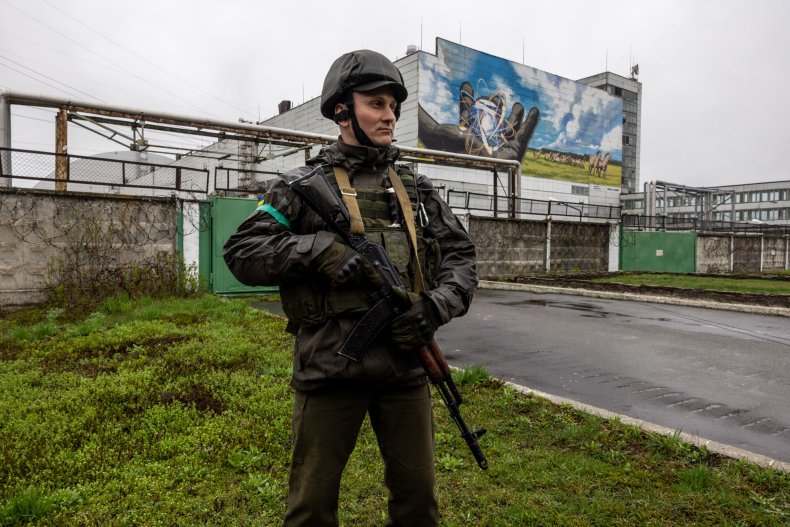
Nuclear Lose-Lose
Tensions at the plant appear lower than they were last summer when both sides were accusing the other of flirting with a major nuclear incident. The ZNPP has gone offline multiple times as a result of artillery fire since Russia's February 2022 invasion, but staff there have prevented a catastrophe.
Since last year, all six of the ZNPP's reactors have been in a so-called cold shutdown, with operators carefully monitoring and maintaining the site. But late last year, two of the six reactors were put into "hot shutdown," in which temperature and pressure are slowly allowed to rise to enable a low level of operation.
Mark Hibbs, a nonresident senior fellow at the Carnegie Endowment for International Peace's nuclear policy program, told Newsweek that under normal operating conditions, even maintaining a cold shutdown requires operators who are "cool and collected, on their toes, paying attention and carefully fulfilling their professional obligations."
"This is not a normal situation," Hibbs said. "The bottom line is, this is a place where you have a hostile occupying foreign power. You have personnel who know how to operate the plant and are responsible for doing that, who have been intimidated by the Russian occupiers. And to an extent, that discourages staff from operating the plant as it should be operated. It raises safety threats at the installation."
It is hard to see a benefit to either side in a serious nuclear accident, even if both Moscow and Kyiv are looking to leverage concerns about such an incident to improve their political and military positions.
"The Russians would not blow it up," Oleg Ignatov, the Crisis Group think tank's senior analyst for Russia, told Newsweek. "It doesn't make sense for them because it would hurt the entire region, including Crimea. The consequences would be very high."
"Right now, the Russians don't want to leave, and they are not going to leave," Ignatov said. In the case of a Ukrainian offensive, "they wouldn't need to take over the power plant. They would just need to circumvent it."
Southern Ukraine has been touted as one of the most likely locations for the coming Ukrainian counteroffensive. If Kyiv's troops can cut off the land corridor running through the south to Russia's southwestern borders, the strategic Crimean Peninsula will be isolated. Success in the south might also force the Russians to give up the ZNPP, which now gives Moscow major leverage.
"The scenario of liberation of the occupied Enerhodar and ZNPP is unknown to anyone, except for the command of the Armed Forces of Ukraine," Orlov said. "I can say one thing: No one is interested in a nuclear accident."
He continued: "I am confident that in the case of Enerhodar, the military command is well aware of all the risks of warfare directly near the ZNPP and considers the most acceptable scenarios of de-occupation.
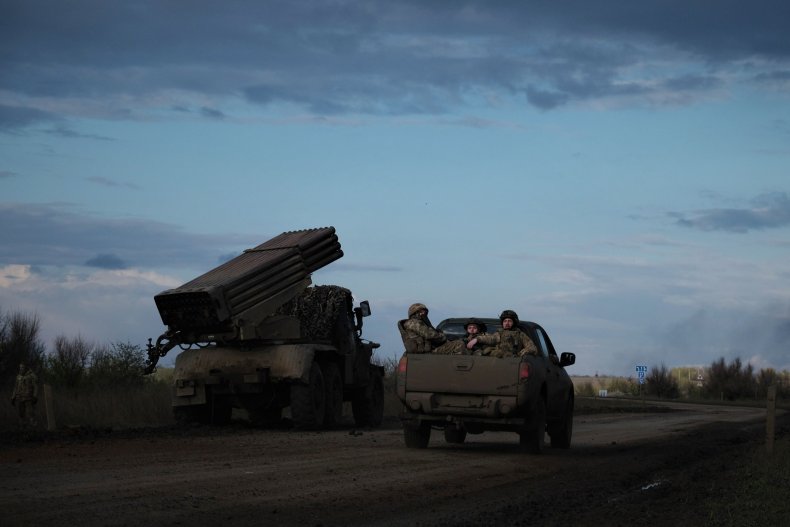
"The only way to secure the ZNPP is to de-occupy Enerhodar, completely free the nuclear power plant from the presence of the Russian military, allow personnel to return to their workplaces and work in acceptable conditions, plus resume scheduled repair campaigns, personnel training and so on. And the second step is to establish a safe zone over the city at the site of the ZNPP," Orlov said.
Oleh Korikov, Ukraine's acting chief inspector for nuclear and radiation safety, told reporters on Tuesday that specialists are already preparing for the liberation of the ZNPP.
Korikov did note concerns about "weapons, explosive devices and military material" stationed at the site, which he said was now being used as a Russian military equipment repair facility.
Oleksandr Merezhko, a member of Ukraine's parliament and the chair of the body's foreign affairs committee, told Newsweek the international community cannot take anything for granted.
"Everything is possible, and we can expect any provocation from Russia," Merezhko said. He added that international pressure might dissuade Moscow and its troops.
"Russia has already used nuclear blackmail. We should be prepared for any scenario, Merezhko said. "At the same time, I suppose that countries which belong to the nuclear club—including India and China—are not interested in Russia using the ZNPP for nuclear blackmail. Such positions of the nuclear states may even have some deterrent effect upon Russia."
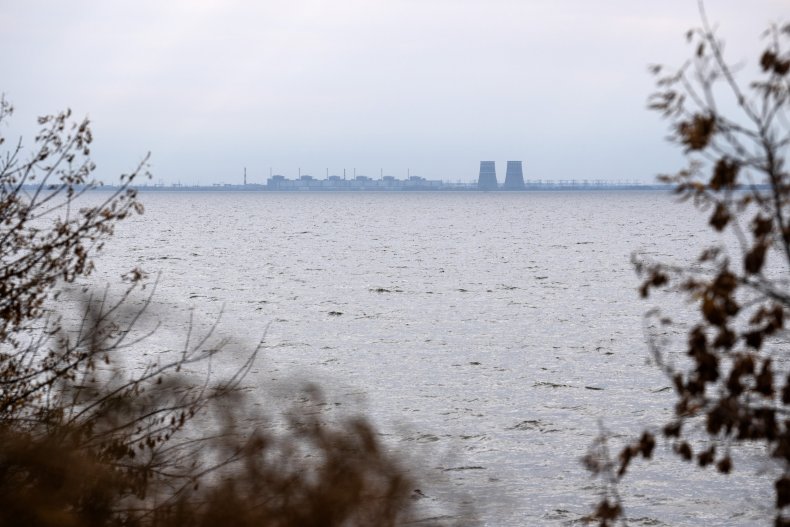
Hibbs concurred that Moscow "would have no strategic interest in causing a severe accident at a nuclear power plant that it occupies." But war is unpredictable.
"The level of the destruction that we've seen in the war and the level of egregious violence—including on the part of the Russian forces—raise serious questions about how the Russians would behave in a situation like this," he said.
He continued: "There are also questions about the stability and the nature of Russian command. There are military actors which are not official. There are private armies, there are troops in the field where the extent to which they are being commanded effectively by people in Moscow who are directing the war effort is not clear. There are a lot of unanswered questions about how combatants in the field would behave."
Malice is not the only path to catastrophe. A "chaotic" fight within the nuclear compound, Hibbs said, might simply prevent operators from doing what is necessary to keep the plant stable.
"If the personnel are interfered with or are prevented from taking action, then essentially what could be a severe accident scenario in the beginning could continue to deteriorate. That's a very serious situation if the war comes to the plant site," he said.



